To adapt meal plans for weight loss, start by calculating your calorie needs based on your Basal Metabolic Rate and Total Daily Energy Expenditure. Focus on your food preferences and incorporate a variety of nutrient-dense options while controlling portion sizes. Set realistic, SMART goals that align with your lifestyle and share them with a support system. Meal prepping can help keep you organized and make healthy choices easier. Finally, track your progress regularly and stay flexible to adapt your meals as needed. There's a lot more to explore about optimizing your journey to lasting weight loss success.
Key Takeaways
- Calculate your BMR and TDEE to establish appropriate calorie limits for effective weight loss.
- Incorporate a balance of proteins, fats, and carbohydrates to meet nutritional needs while promoting satiety.
- Personalize meal plans by identifying favorite foods and experimenting with new recipes to maintain engagement and enjoyment.
- Utilize meal prep to ensure easy access to healthy options and to control portions effectively throughout the week.
- Monitor progress regularly and adjust meal plans based on results, ensuring flexibility to adapt to changing circumstances.
Understand Your Caloric Needs
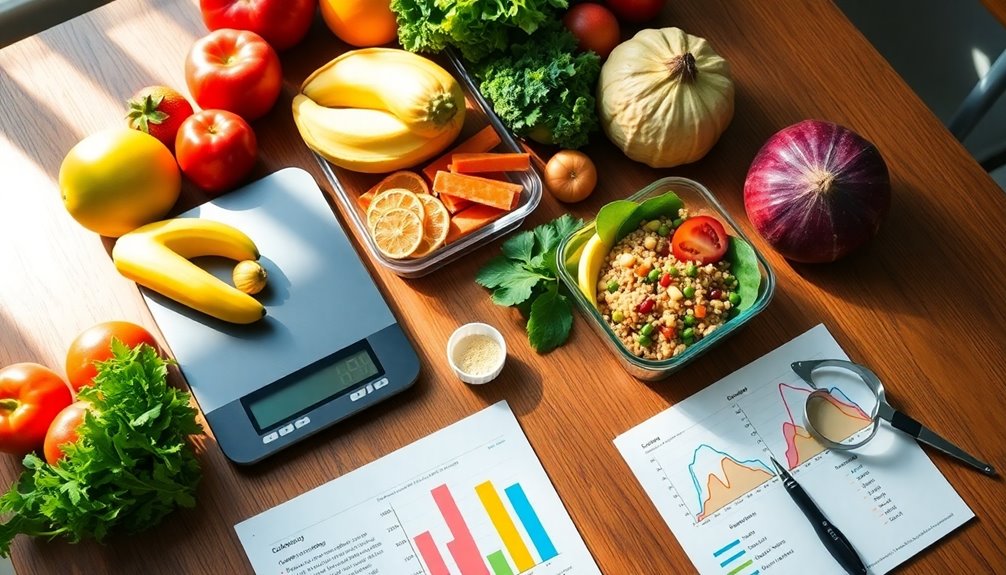
Understanding your caloric needs is crucial for effective weight loss. It's not just about cutting calories; it's about knowing how many you truly need to reach your goals. Start by calculating your Basal Metabolic Rate (BMR), which represents the calories your body burns at rest.
From there, factor in your activity level to determine your Total Daily Energy Expenditure (TDEE). This gives you a solid foundation to work from.
Once you know your caloric needs, tracking progress becomes essential. Use a journal or a mobile app to log your food intake. This practice helps you stay accountable and can reveal patterns in your eating habits.
You'll not only notice how many calories you're consuming but also how those calories are distributed among macronutrients—proteins, fats, and carbohydrates. Balancing macros is key to fueling your body while losing weight.
Each macronutrient plays a unique role, and getting the right balance can enhance your energy levels, support muscle maintenance, and improve overall well-being. Additionally, understanding your caloric needs aligns with natural calorie cycles which can help promote sustainable weight loss.
Identify Your Food Preferences
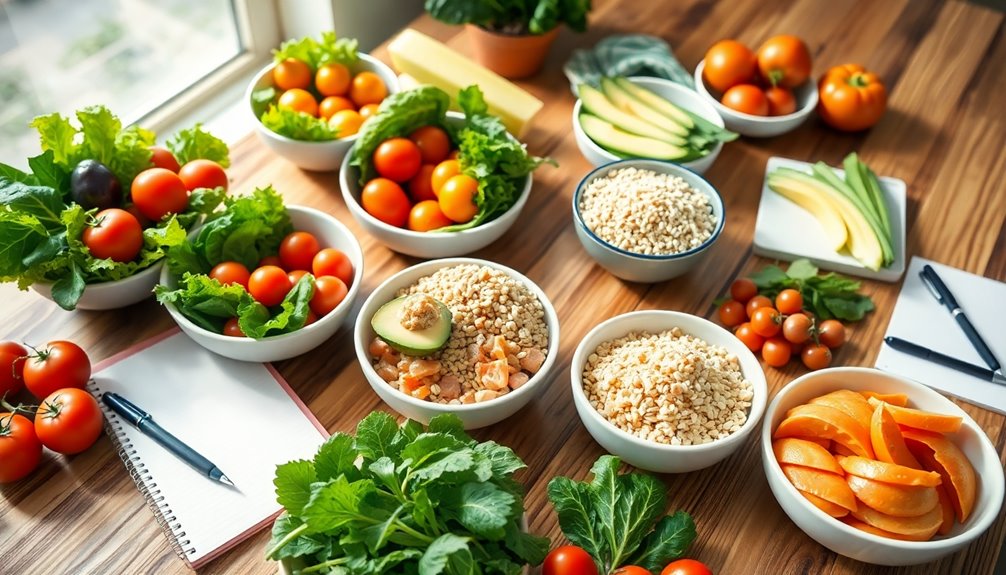
Once you've established your caloric needs, the next step is to identify your food preferences. Knowing what you enjoy eating is essential for sticking to a meal plan. Start by considering your favorite foods and flavors. Do you lean towards spicy dishes, or do you prefer something milder? Identifying these flavor profiles will help you create meals that excite your palate, making it easier to stay committed to your weight loss journey.
Next, think about the cooking techniques you enjoy. Whether you love grilling, roasting, or stir-frying, your preferred methods can make meal prep more enjoyable and less overwhelming. If you're more comfortable with quick, simple recipes, focus on meals that fit that mold. This won't only save you time but also reduce the chances of falling back on takeout when you're feeling overwhelmed.
Don't forget to explore new cuisines and ingredients. Expanding your culinary horizons can introduce you to healthier options that still satisfy your cravings. For instance, if you love Italian food, you might experiment with whole grain pasta or zucchini noodles, combining them with fresh herbs and lean proteins. Embracing a whole-food plant-based diet can further enhance your nutritional intake while supporting your weight loss journey.
Ultimately, your food preferences should guide your meal planning. When you tailor your meals to align with what you love, you're more likely to enjoy the process and achieve your weight loss goals without feeling deprived. You belong in this journey, and your tastes deserve a spot at the table.
Set Realistic Goals

Setting realistic goals is essential for sustainable weight loss success. When you commence on your journey, it's critical to focus on attainable targets that align with your lifestyle and preferences. Instead of aiming for dramatic weight loss in a short time, consider setting smaller, more manageable goals. This approach not only enhances your motivation but also helps you build confidence as you achieve each milestone.
Effective goal setting involves identifying what you truly want and why. Write down your goals, making them specific, measurable, achievable, relevant, and time-bound (SMART). For example, instead of saying you want to lose weight, specify that you aim to lose 1-2 pounds per week. This clarity provides a roadmap for your journey and helps you stay focused.
Accountability is another essential component of this process. Share your goals with friends, family, or a support group. Having someone to check in with can keep you motivated and on track. When you know others are rooting for you, it fosters a sense of belonging and community.
Lastly, don't hesitate to seek professional support if needed. A dietitian or personal trainer can help tailor your meal plans and provide guidance, ensuring your goals remain realistic and achievable. Additionally, consider utilizing a custom keto diet plan to further support your weight loss journey. Remember, this journey is yours, and finding the right balance of goal setting, motivation, accountability, and support will pave the way for lasting change.
Incorporate Variety in Meals
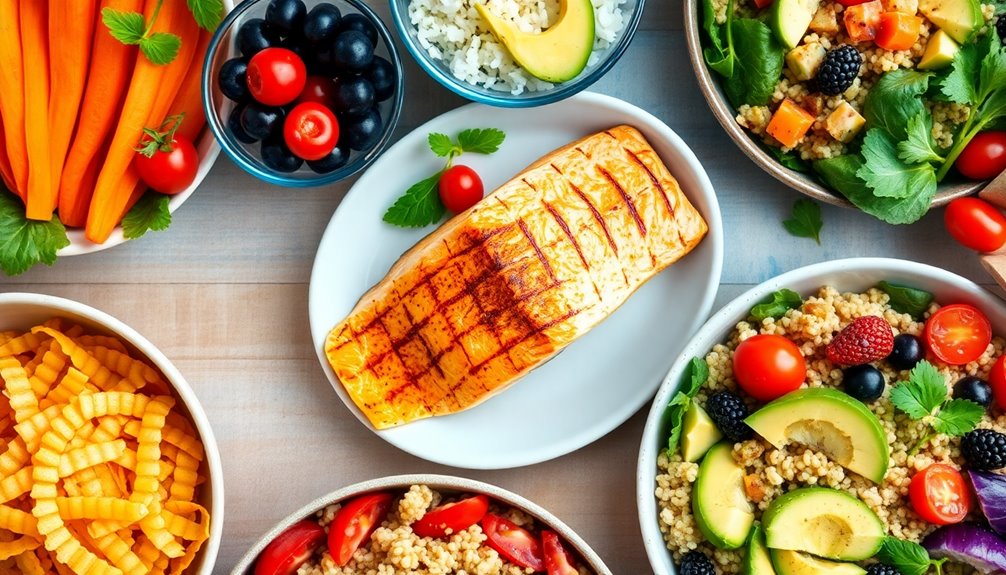
Achieving weight loss goals involves more than just tracking calories; it's also about enjoying a diverse range of foods. Incorporating variety into your meals not only keeps you satisfied but also helps you stick to your plan long-term. You don't have to eat the same thing every day. Explore different flavor combinations to excite your palate. For instance, try pairing sweet potatoes with savory spices like cumin or cinnamon to elevate your dishes.
Experimenting with various cooking techniques can also enhance your meals. Grilling, steaming, or roasting can transform the same ingredients into entirely new dishes. Instead of boiling broccoli, consider roasting it with a sprinkle of garlic and a drizzle of olive oil for a crunchy, flavorful side. Each method brings out different textures and tastes, making your meals enjoyable.
You can also mix cuisines! Combining elements from different culinary traditions can lead to delicious discoveries. Think of a quinoa salad with Mediterranean ingredients like feta cheese and olives, or a stir-fry that incorporates seasonal vegetables from your local market. Adding protein-packed vegan smoothies to your meal plan can provide a nutritious boost, helping you achieve your weight loss and energy goals.
Focus on Nutrient-Dense Foods
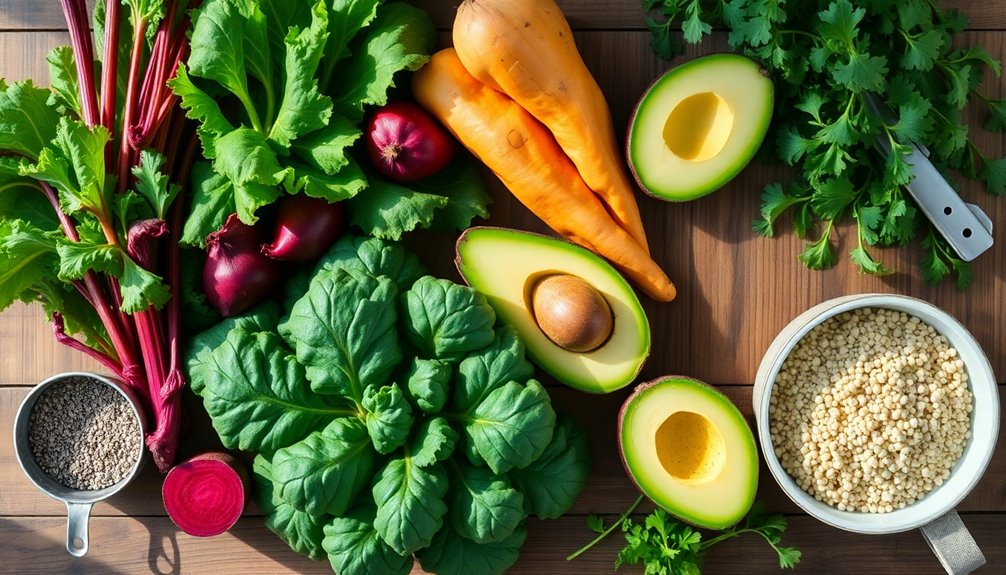
Focusing on nutrient-dense foods is essential for effective weight loss and overall health. By prioritizing these foods, you make smart choices that not only provide essential nutrients but also help you feel full longer. This approach allows you to enjoy your meals while still reaching your weight loss goals.
Consider making healthy swaps in your meals. For example, instead of reaching for processed snacks, opt for whole foods that are packed with vitamins and minerals. Below is a table illustrating some easy healthy swaps:
| Current Choice | Healthy Swap | Benefits |
|---|---|---|
| White bread | Whole grain bread | More fiber, keeps you fuller |
| Sugary yogurt | Greek yogurt | Higher protein, less sugar |
| Potato chips | Air-popped popcorn | Lower calories, whole grain |
| Soda | Sparkling water | No added sugars, hydration |
These swaps not only enhance your meals but also support a balanced diet. When you fill your plate with nutrient-dense options, you're less likely to overeat. Focus on colorful fruits, vegetables, lean proteins, and whole grains. These foods provide the energy and nutrients you need without excessive calories. Additionally, incorporating smoothies into your diet can be a great way to maximize weight loss results while enjoying delicious, nutrient-rich meals.
Incorporating nutrient-dense foods into your diet is a journey that fosters belonging in a community focused on health and wellness. Together, you can support each other in making these smart choices to achieve your weight loss goals.
Plan for Snacking
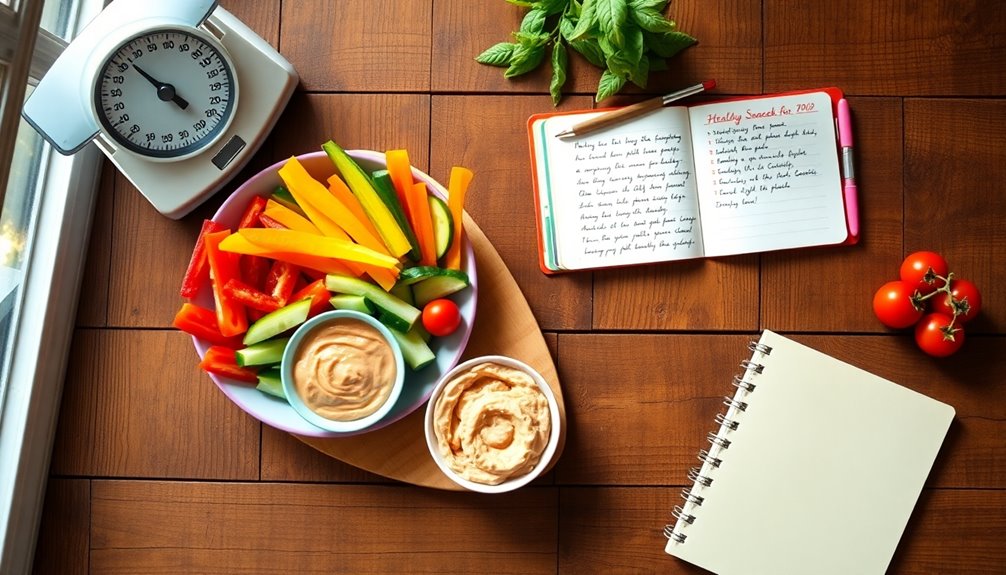
Snacking plays an important role in maintaining your energy levels and supporting your weight loss journey. When you plan for snacking, you can keep hunger at bay and avoid overeating during meal times. It's all about choosing the right snack options and timing them effectively throughout your day.
Here are some tips to help you snack mindfully:
- Choose nutrient-dense snacks: Opt for options like fruits, veggies with hummus, or yogurt, which provide vital vitamins and minerals.
- Mind your snack timing: Plan your snacks between meals to help stabilize blood sugar levels and maintain your energy.
- Stay hydrated: Sometimes, thirst can be mistaken for hunger. Drink water before reaching for a snack.
- Incorporating plant-based snacks can enhance your health journey as plant-based diets are linked to lower cholesterol and better skin.
Adjust Portion Sizes
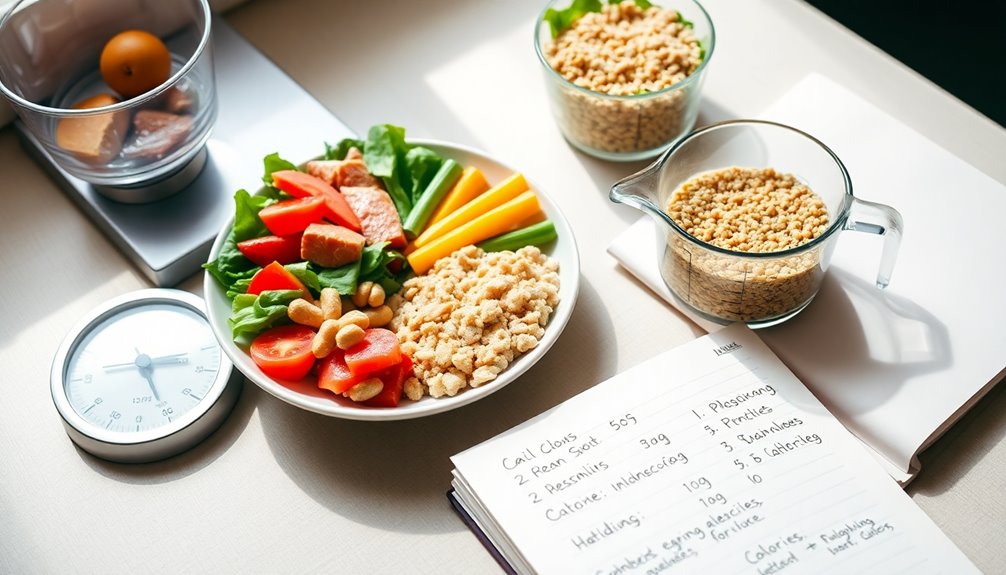
Adjusting portion sizes is a key strategy in your weight loss journey that can greatly impact your progress. By being mindful of how much you eat, you can create a calorie deficit while still enjoying your favorite foods. Consider using serving suggestions as a guide.
For example, instead of filling your plate to the brim, aim for a balanced plate that includes appropriate portions of proteins, carbohydrates, and healthy fats.
Ingredient substitutions can also play a significant role. If you normally use high-calorie ingredients, swapping them for lower-calorie alternatives can help you maintain flavor without overloading on calories.
For instance, using Greek yogurt instead of sour cream or zucchini noodles instead of pasta can help you enjoy satisfying meals while keeping your portions in check. Incorporating Keto recipes can provide delicious options that align with your weight loss goals.
Meal timing and meal frequency are also essential factors when adjusting portion sizes. Eating smaller, more frequent meals can help prevent overeating later in the day.
Meal Prep for Success
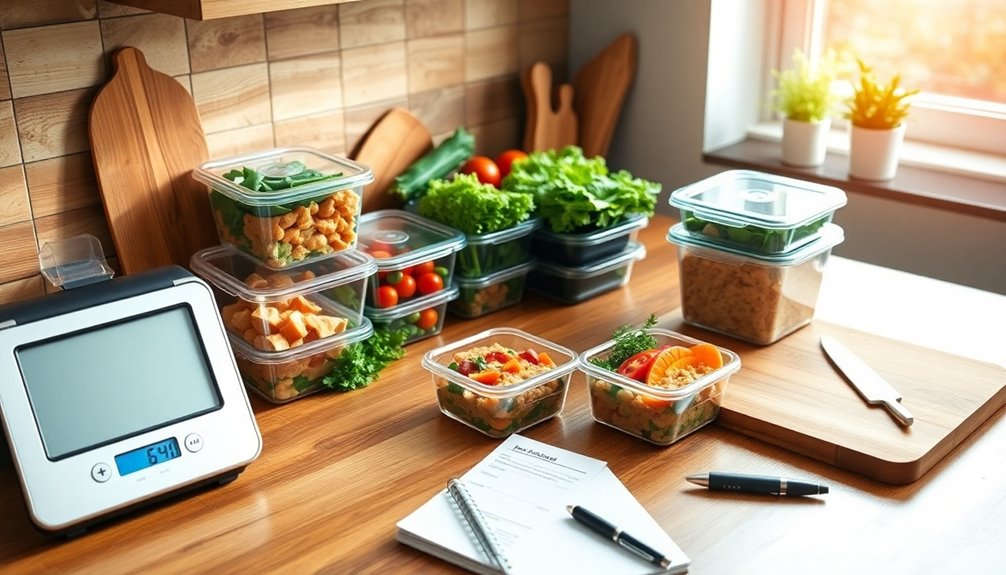
Meal prepping can be a game changer for your weight loss journey, helping you stay on track with your nutrition goals. By dedicating a few hours each week to plan and prepare your meals, you set yourself up for success, boost your time management skills, and make healthier choices easier.
Here are some tips to kickstart your meal prep:
- Plan Your Week: Choose specific days to prep meals, guaranteeing you have a clear roadmap for your week.
- Batch Cook: Prepare larger portions of your favorite healthy recipes, portioning them out for easy access.
- Stay Flexible: Have a few backup recipe ideas that can be whipped up quickly if you're short on time or ingredients.
Meal prepping isn't just about convenience; it's about creating a sense of community and belonging. Sharing meal prep tips and recipes with friends or family can enhance your experience and motivate you to stick to your goals. You'll find that having meals ready to go reduces the temptation to grab unhealthy options when you're busy or tired.
Consider incorporating a variety of nutritious foods into your recipe ideas, including lean proteins, whole grains, and vibrant vegetables. Not only will this keep your meals interesting, but it'll also guarantee you're meeting your nutritional needs.
Embrace meal prepping as a tool that empowers you on your weight loss journey, making it a sustainable and enjoyable part of your lifestyle.
Monitor Your Progress

To effectively reach your weight loss goals, monitoring your progress is critical. By keeping track of your results, you can see what's working and where you might need to make adjustments. It's not just about the scale; measuring success involves various factors, like energy levels, fitness improvements, and how your clothes fit.
Here's a simple table to help you visualize your progress:
| Date | Weight (lbs) | Notes |
|---|---|---|
| Week 1 | 150 | Started meal prep |
| Week 2 | 148 | Increased workouts |
| Week 3 | 147 | Felt more energetic |
| Week 4 | 145 | Celebrating 5-pound loss |
| Week 5 | 144 | Adjusted calorie intake |
Tracking results regularly helps you identify trends and patterns. If you hit a plateau, it might be time to adjust your strategy—whether that means changing your meal plan or trying new exercises. Remember, celebrating milestones, like losing those first few pounds or fitting into a favorite outfit again, is vital. These victories keep you motivated and remind you that you're on the right path. Additionally, understanding the effects of snoring can help you consider how sleep quality impacts your overall health and fitness journey.
Staying engaged with your progress fosters a sense of belonging in your weight loss journey. You're not just doing this alone; many others are on similar paths. Embrace the process, and don't forget to celebrate every step forward!
Stay Flexible and Adapt

Your weight loss journey necessitates a certain level of flexibility to adapt to changing circumstances and personal needs. Life is unpredictable, and staying rigid with your meal plan can lead to frustration. By embracing a flexible mindset, you can better navigate challenges while maintaining your commitment to healthy habits.
Here are some tips to help you stay adaptable:
- Practice mindful eating: Pay attention to your hunger cues and relish your meals without distractions. This can help you make better choices and avoid overeating.
- Adjust portion control: If you find yourself feeling hungry or overly full, don't hesitate to tweak your portion sizes. It's crucial to listen to your body and find the right balance that works for you.
- Plan for special occasions: Whether it's a birthday or a holiday, allow yourself some leeway. Enjoying treats in moderation can help you stay on track without feeling deprived.
- Remember that a healthy liver is essential for effective weight stability, which can significantly impact your weight loss efforts.
Frequently Asked Questions
How Do I Handle Cravings While on a Meal Plan?
Handling cravings can be challenging, but you've got strategies to manage them. Focus on cravings management by opting for healthy alternatives—like fruit instead of sweets.
Practice mindful eating to truly savor what you eat, and use portion control to enjoy treats without overindulging. Remember, it's about balance, not restriction.
When cravings strike, remind yourself that it's okay to enjoy food while staying aligned with your goals. You're not alone in this journey!
Can I Eat Out While Following My Meal Plan?
Did you know that 70% of Americans eat out at least once a week?
You can absolutely eat out while sticking to your meal plan. Focus on dining options that offer healthier choices, like grilled proteins and salads. In social situations, don't hesitate to ask for modifications, like dressing on the side. Remember, it's all about balance. Enjoying meals with friends can enhance your experience while still aligning with your goals.
What if I Have Food Allergies or Intolerances?
If you have food allergies or intolerances, you can still enjoy your meals by substituting ingredients that work for you. Focus on customizing portions to match your dietary needs while keeping your meals balanced.
For instance, swap dairy with almond milk or replace gluten with quinoa. This way, you'll create delicious, safe meals that fit your preferences, ensuring you feel included and satisfied while maintaining a healthy eating pattern.
How Can I Stay Motivated During Weight Loss?
Staying motivated during weight loss can be challenging, but setting specific goals helps you stay focused.
Find accountability through friends or support groups; sharing your journey can boost your resolve.
Track your progress regularly—seeing those achievements can keep you inspired.
Incorporate a reward system for when you hit milestones; it makes the process enjoyable.
Should I Consult a Professional for Meal Planning?
Absolutely, consulting a professional for meal planning can be beneficial. They offer customized approaches that align with your personal goals, ensuring you receive tailored advice.
While online resources can provide general guidelines, professional assistance helps you navigate the complexities of nutrition. A dietitian or nutritionist can create a plan that fits your lifestyle and preferences, making it easier to stay motivated and achieve sustainable results.
You're not alone in this journey; support is available!
Conclusion
Incorporating these strategies into your meal planning can greatly enhance your weight loss journey. Research shows that individuals who track their food intake are 50% more likely to achieve their weight loss goals. Remember, it's not just about cutting calories; it's about nourishing your body with the right foods and creating a sustainable plan. Stay flexible, listen to your body, and adjust as needed to find what works best for you. Your path to success is unique—embrace it!



